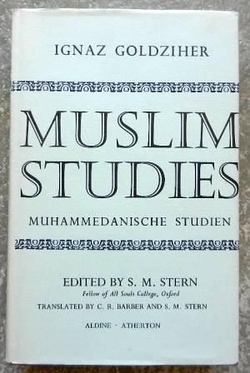 In the centuries-long orientalist study of Islam, perhaps the single most important book ever published was the two-volume Muhammedanische Studien in 1889-90 (here in a new edition of S.M. Stern's English translation) by the Hungarian Jewish scholar Ignaz Goldziher (1850-1921).
In the centuries-long orientalist study of Islam, perhaps the single most important book ever published was the two-volume Muhammedanische Studien in 1889-90 (here in a new edition of S.M. Stern's English translation) by the Hungarian Jewish scholar Ignaz Goldziher (1850-1921).
In it, Goldziher questioned the great mass of specific detail in the Arabic literary sources about the life of the Prophet Muhammad and the origins of the Islamic religion. Noting that the earliest of these sources were first written down about a century after Muhammad's death in 632 c.e., and most of them from considerably later, he raised doubts whether these had actually been transmitted orally and accurately from the prophet's own time.
Instead, he proposed a different history: that this later information was developed centuries later as part of arguments of those later times. By analogy, it would be as though new facts were appearing in print in 1989 about the French revolution not because they had been quietly passed on from one generation to the next for over two centuries but because they were being conjured up in the context of current French arguments about current controversies.
This approach to early Islamic history has proven a very fruitful one since Goldziher's time, leading to profound reassessments of the prophet's life, the origins of Islam, and the development of Islamic law. In time, these led to some radical reinterpretations.